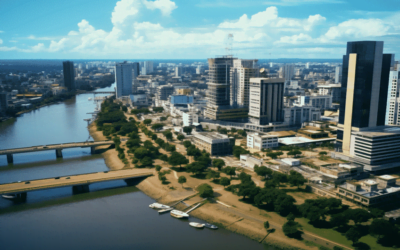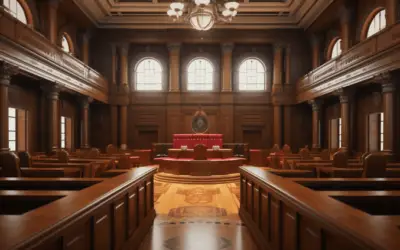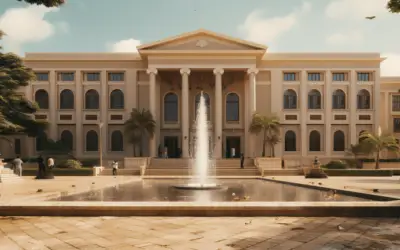Are you, like me, fascinated by the world of drones and aerial exploration? Perhaps you’re an enthusiast seeking to navigate the skies of El Salvador with your trusty drone.
You’ve come to the right place! I understand your curiosity and quest for knowledge when it comes to El Salvador’s drone laws.
In my journey to uncover the secrets of El Salvador’s drone regulations, I’ve dived deep into the sea of information, conducting extensive research to find all the answers you need.
Whether you’re a hobbyist, a commercial operator, a visitor to this beautiful country, or even a government entity, I’ve got the insights to demystify the drone laws and guide you through the dos and don’ts.
So, if you’re eager to explore El Salvador’s skies with your drone and want to navigate the intricate web of regulations, you’re in the right place. I invite you to read on and join me on this journey through El Salvador’s drone laws.
Whether you’re seeking guidance on registration, safe practices, or understanding the nuances of different categories of drone operators, my article will provide the answers you’ve been searching for. Let’s embark on this adventure together!
- Understanding Drone Use in El Salvador
- General Regulations for Drone Operations
- Obtaining a License or Authorization to Operate Drones
- Specific Regulations for Different Drone Operators
- Compliance and Safety Best Practices
- Final Thoughts on EL Salvador Drone Laws
- Frequently Asked Questions About El Salvador Drone Laws
Understanding Drone Use in El Salvador

Let’s delve into the fascinating world of drone use in El Salvador—a world that’s rapidly evolving and brimming with possibilities.
Understanding how drones are utilized in this country requires us to navigate through regulations, categorizations, and various operational distinctions. So, fasten your seatbelt (or should I say propellers?) as we explore the ins and outs of drone use in El Salvador.
Permissibility of Drone Use in El Salvador
El Salvador welcomes drone enthusiasts with open skies, embracing the burgeoning potential of unmanned aerial vehicles. The Civil Aviation Authority of El Salvador (AAC) governs these airborne marvels, ensuring both safety and accountability in their usage.
As a drone aficionado, you’ll find solace in the fact that operating drones for recreational or commercial purposes is permissible without excessive red tape.
However, and as with any jurisdiction, there are specific regulations that ensure responsible flying—rules that, once understood, allow you to fully embrace the wonder of the aerial realm.
Categorization of Drones Based on Weight and Purpose
Drones, like any diverse group, come in various shapes and sizes, each designed with a specific purpose in mind. In El Salvador, these unmanned aerial companions are categorized based on their weight and intended use.
From nimble recreational drones that buzz in the sky for leisure to robust commercial drones undertaking more substantial tasks, each has its defined role.
Understanding these categorizations is like comprehending different tools in a toolbox—a matter of choosing the right one for the job at hand.
Distinctions between Private, Leisure, Commercial, and Government Drone Operations
Imagine a spectrum of drone operations, ranging from personal leisure flights to critical governmental functions.
El Salvador recognizes this spectrum and draws distinctions to tailor regulations accordingly. Private operators, leisure seekers, commercial ventures, and government agencies all fall under the drone umbrella, each with its own set of rules and responsibilities.
Much like traffic lanes on a busy road, these distinctions keep the drone airspace organized and safe, allowing each category to soar and fulfill its unique objectives without unnecessary turbulence.
Also Read: Egypt Drone Regulations 2024
General Regulations for Drone Operations

Ah, the nitty-gritty of drone regulations! Now that we’ve got a grasp on the lay of the land, it’s time to dive into the specifics of El Salvador’s drone laws.
It’s like deciphering the rules of a board game, each piece with its unique role and restrictions. From registrations to safety checks, and privacy considerations to no-fly zones, we’ll unravel the regulatory tapestry that keeps the drone community soaring safely.
Registration and Certification Requirements for Different Categories of Drone Operations
As with any adventure, there’s paperwork involved when you embark on a drone journey. El Salvador’s regulations make a distinction between various categories of drone operations, each with its own set of requirements.
First up, we have the registration process, a bit like obtaining a passport for your drone, and then there are certifications tailored to hobbyists and commercial operators.
Registration Process and Requirements
Think of drone registration as akin to licensing your car; it’s essential for accountability. El Salvador insists that drones, depending on their use, need to be registered with the Civil Aviation Authority.
These registrations include crucial information about the drone, its operator, and are an essential part of ensuring the skies remain safe for all.
Compliance is key, but don’t worry; the process is fairly straightforward, though it might seem like filling out paperwork for an exciting journey.
Certification for Hobbyists and Commercial Operators
Just as you’d want a driver’s license to hit the open road, drone operators in El Salvador have their own certification requirements.
Hobbyists enjoy a specific path, as do commercial operators. These certifications ensure that the operators have the knowledge and skills needed to fly responsibly and safely.
It’s much like obtaining a scuba diving license before plunging into the deep; certifications act as a safety net for all involved.
Pre-flight Inspections and Safety Measures
Before your drone takes flight, it’s crucial to ensure it’s in tip-top shape. Much like checking your car’s engine and brakes before a road trip, drones require pre-flight inspections to guarantee their functionality and safety.
Ensuring Safe Drone Functionality
Safety starts on the ground. Each time a drone takes off, it’s vital that it’s in perfect working condition.
Operators are required to inspect their drones before flight to ensure that everything is functioning as it should. It’s a bit like examining an aircraft before it takes to the skies; pre-flight inspections are the first line of defense in ensuring a safe journey.
Compliance with Safety Regulations
To keep the skies safe, El Salvador has specific safety regulations that operators must adhere to. These regulations are in place to prevent accidents and collisions.
Operators must follow altitude limits, and safety guidelines, and ensure that their drones don’t pose a threat to others in the airspace. Think of it like following traffic rules on the road; they’re there for everyone’s safety.
Privacy and Operating Restrictions
Privacy is paramount in the world of drones. Just as we wouldn’t want our neighbors peering into our homes, El Salvador has strict rules to protect individuals’ privacy and define where drones can and cannot fly.
Rules for Privacy Protection
El Salvador respects individuals’ privacy.
This means you need written authorization to operate your drone over private property. Think of it as obtaining permission before setting foot in someone’s garden. Privacy is a fundamental right, even in the sky.
Restricted Operating Areas and Altitude Limits
There are areas in El Salvador where drones cannot operate. These include places like airports, heliports, and even sensitive facilities. Imagine these zones as no-entry areas, similar to secure government buildings where access is restricted.
Prohibited Flight Conditions and Zones
Certain flight conditions and zones are off-limits, such as flying at night or in poor weather conditions. The safety of both your drone and others in the airspace is the top priority. These restrictions, in a way, are like traffic detours due to a sudden storm; it’s all about navigating safely.
Also Read: Ecuador Drone Regulations 2024
Obtaining a License or Authorization to Operate Drones

Now that we’re getting into the nitty-gritty of drone operations, let’s chat about the essential process of obtaining a license or authorization to operate your drone in El Salvador.
This is the part where you get the green light to take your bird to the skies and explore, but first, you need to navigate the regulatory path.
Process of Registering Drones and Operators with AAC
Registering your drone and yourself as the operator is a pivotal step in ensuring your drone flights remain on the right side of the law.
Just think of it as registering your car with the local motor vehicle department. In El Salvador, the Civil Aviation Authority (AAC) is your go-to authority for this process.
They’ve streamlined it, making it relatively straightforward. You’ll need to provide information about yourself, your drone, and a few other key details. It’s like filling out a form before embarking on a journey – a bit of admin to keep things organized.
Detailed Information Required for Registration
When you dive into the registration process, there are a few key details you’ll need to provide. Much like booking a flight, you’ll need your passport and personal information.
For drone registration, this includes details about the drone’s manufacturer, model, serial number, and even the specifics of your remote control station. It’s a bit like providing your personal details when you book a flight ticket; it’s all in the name of safety and organization.
Fees Associated with Drone and Operator Registration
Now, let’s talk about the not-so-fun part—fees. Just like paying for parking when you head out for a day of adventure, registering your drone and yourself as an operator in El Salvador comes with a cost.
The current fees for registration are quite reasonable, with a fee for both the drone and the operator. It’s a bit like paying for an entry ticket to a theme park; the fee ensures that the skies remain a safe and organized space.
Registration Process for Foreign Operators
What if you’re a foreign operator itching to explore the beautiful skies of El Salvador? No worries, the process accommodates you too. It’s like obtaining a tourist visa for a country you’ve never visited before.
You’ll need to provide a copy of your passport to the authorities. It’s a way to make sure everyone is accounted for in the airspace. El Salvador warmly welcomes visitors, and the drone registration process ensures that you can navigate the skies responsibly.
Also Read: East Timor Drone Regulations 2024
Specific Regulations for Different Drone Operators

Welcome to the chapter on specificity in drone regulations. We’ve already laid the groundwork, and now we’re diving into the distinct rules that apply to different types of drone operators.
Whether you’re a hobbyist soaring for fun or a commercial operator working with drones professionally, El Salvador has tailored regulations to fit your role. It’s like understanding the specific rules of the game you’re playing.
Hobbyist Drone Operators
Hobbyist drone operators, you’re in for a treat. El Salvador has rules that cater to those who fly drones purely for leisure, much like the rules of a friendly backyard game. Let’s take a closer look at what’s in store for you.
Registration and Insurance Requirements
Just as you’d put on your safety gear before a sports activity, hobbyists are required to register their drones with the Civil Aviation Authority of El Salvador.
While insurance isn’t mandatory, it’s highly recommended to ensure you’re covered in case of unexpected mishaps. It’s similar to wearing a helmet while riding a bike; you might not legally need it, but it’s a smart move to protect yourself.
Operating Guidelines and Restrictions
Hobbyists, you’re free to explore the skies for fun, but there are guidelines to keep in mind. Keep your drone at a maximum altitude of 400 feet, and always maintain visual contact with it.
Much like playing with a remote-controlled toy, you should operate your drone in daylight and under good weather conditions, avoiding sensitive areas and airports. These rules are akin to playground rules that ensure everyone’s safety.
Commercial Drone Operators
For commercial drone operators, it’s time to talk business. El Salvador recognizes your professional use of drones and has specific regulations to govern your operations, similar to how companies have their own set of operational rules.
Licensing, Registration, and Insurance Obligations
Operating commercially requires a more robust approach. You’ll need a commercial drone pilot license, your drone must be registered, and insurance is a must.
It’s like obtaining a driver’s license, registering your company vehicles, and having insurance coverage. These steps ensure that you’re not only skilled but also accountable in your professional drone ventures.
Compliance with Commercial Regulations
Commercial operators must adhere to specific regulations, ensuring their drones meet all safety requirements and that they are compliant with the laws governing commercial drone operations.
It’s a bit like the quality checks a manufacturer performs before shipping their products; it ensures a high standard of safety and professionalism.
Drone Use by Visitors to El Salvador
Greetings, fellow adventurers! Let’s talk about something exciting – exploring the Salvadoran skies with your drone if you’re visiting this beautiful country.
There are specific rules designed to make sure your drone adventure is smooth and in harmony with the Salvadoran airspace.
Registration and Licensing Process for Foreign Visitors
you’ve just landed in a new country, and you’re eager to unleash your drone into the skies. Well, visiting drone enthusiasts, El Salvador has got you covered.
While you’re here, the process involves providing a copy of your passport to the Civil Aviation Authority.
It’s like going through customs at the airport – a necessary but relatively straightforward step to ensure that everything is in order before you set out on your drone-fueled exploration.
Operating Rules for Tourists and Visitors
Once you’re cleared for takeoff, it’s time to understand the rules of the Salvadoran skies. You’re free to fly within certain parameters, just like you’d follow the rules of the road when driving in a new city.
Maintain a maximum altitude of 400 feet and steer clear of restricted areas. It’s akin to being mindful of speed limits and traffic signs; these rules keep everyone safe and ensure a pleasant flying experience.
Government Drone Operators
Ah, the guardians of the sky. Government drone operators have their own set of regulations in El Salvador, designed to ensure smooth operations and align with national interests.
Licensing and Registration Guidelines for Government Entities
For government drone operators, the process is slightly different. It’s like obtaining a special permit for a unique event. There are specific guidelines they must follow, to ensure they register their drones and obtain the necessary licenses. This registration allows authorities to keep track of drone usage for official purposes.
Exceptions and Exemptions for Government Drone
Use Governments often have unique needs. El Salvador recognizes this and offers certain exceptions and exemptions for government drone use. It’s a bit like diplomatic privileges – special allowances within the regulatory framework.
These exemptions are carefully defined to cater to essential government operations while maintaining safety and privacy standards.
Also Read: Dominican Republic Drone Regulations 2024
Compliance and Safety Best Practices

Now that we’ve unraveled the intricate web of drone laws in El Salvador, let’s delve into something that’s vital for all drone enthusiasts – compliance and safety.
Think of it as the heart and soul of responsible drone operation, much like ensuring your car is in tip-top shape before a long road trip.
Importance of Responsible Drone Operation
Operating your drone responsibly is like being a conscientious driver on the road – it ensures your safety and the safety of others. It’s crucial not only for your own well-being but also to maintain the reputation of drone enthusiasts as a whole.
Just as reckless driving can lead to accidents, irresponsible drone operations can have severe consequences. By following the rules, you’re not just adhering to the law; you’re contributing to a safer and more welcoming environment for all drone pilots.
Recommended Safety Measures for All Drone Operators
Safety should always be a top priority when flying drones, and it’s as fundamental as wearing a seatbelt in a car. Everyone, from hobbyists to commercial operators, should implement safety measures.
This includes maintaining your drone in good working condition, conducting pre-flight checks, and having insurance for those unexpected moments. Imagine these measures as airbags and brakes in your drone journey – they’re there to protect you and those around you.
Encouraging Compliance with El Salvador’s Drone Laws
El Salvador’s drone laws exist to create a safe and regulated environment for all drone enthusiasts. Compliance isn’t just about avoiding fines; it’s about respecting the skies and the rules that govern them.
Think of it as respecting the traffic laws while driving; it ensures smooth and organized traffic flow. Encouraging compliance means embracing a shared responsibility to keep the Salvadoran airspace secure, enjoyable, and open for exploration.
Also Read: Dominica Drone Regulations 2024
Final Thoughts on EL Salvador Drone Laws

We’ve embarked on a journey through the skies of El Salvador, exploring the ins and outs of drone laws in this beautiful country. As our adventure comes to an end, it’s time to wrap up our discussion with some key takeaways and reflections.
El Salvador’s drone laws may seem like a labyrinth at first, but they are designed to ensure responsible and safe drone operation.
Remember, as a recreational pilot, you don’t need a license, but you do need to register your drone. For commercial operations, licenses and registration are a must. These laws exist not to restrict but to create a harmonious drone community that shares the Salvadoran skies.
At the heart of these regulations is the spirit of responsibility. Think of it as being a good neighbor in a tight-knit community.
By operating your drone responsibly and complying with the rules, you’re not just adhering to the law but also contributing to a safe and enjoyable drone environment for all. It’s about striking a balance between our passion for flying and respect for the airspace.
Regulations can sometimes feel like constraints, but in reality, they are the guardian angels of our drone adventures. Just as traffic lights keep the roads safe, drone laws ensure the skies remain secure. They provide structure and guidelines that benefit everyone – from hobbyists seeking aerial perspectives to commercial operators delivering essential services. It’s about achieving a delicate equilibrium between freedom and responsibility.
Frequently Asked Questions About El Salvador Drone Laws
1. Do I need a license to fly a drone in El Salvador for recreational use?
In El Salvador, you don’t need a license to fly a drone for recreational use. However, you must register your drone. This registration helps the authorities keep track of drone usage in the country. It’s like ensuring that all vehicles on the road are registered, even if they’re used for personal reasons.
2. Can foreign visitors fly drones in El Salvador?
Yes, foreign visitors are allowed to fly drones in El Salvador. However, they must register their drones with the Civil Aviation Authority and provide a copy of their passport. Think of it as a temporary driving permit when visiting a new country; you’re expected to comply with their rules and regulations.
3. Are there specific regulations for commercial drone operators in El Salvador?
Indeed, El Salvador has regulations tailored for commercial drone operators. To operate commercially, you need a commercial drone pilot license and must register your drone. Compliance with these regulations ensures that your operations are professional and meet safety standards, much like obtaining a commercial driver’s license to drive a truck.
4. What are the privacy and safety guidelines for drone use in El Salvador?
El Salvador’s drone laws include privacy protection rules, including obtaining written authorization to fly over private property. Safety measures include flying below 400 feet, maintaining visual contact with your drone, and avoiding restricted areas and sensitive locations, similar to obeying traffic rules and speed limits while driving.
5. Why are drone regulations necessary in El Salvador?
Drone regulations in El Salvador exist to ensure safe and responsible drone operations. They help maintain a balance between the freedom to fly and the need for safety and privacy. These regulations are in place to protect both drone operators and the general public, similar to how traffic rules and laws ensure road safety for all.













